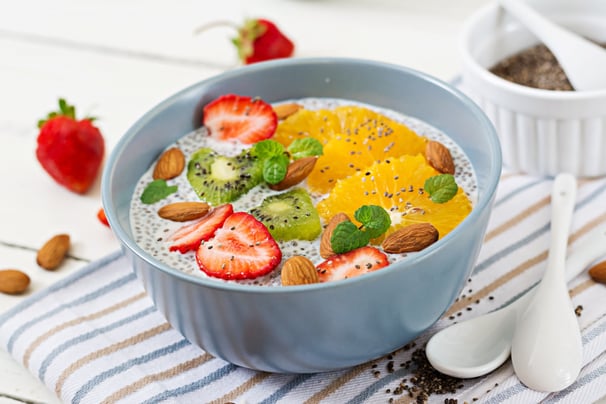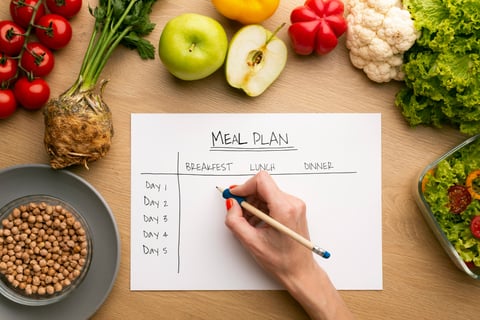Ultimate Guide to Balanced Diets, Superfoods, and Personalized Nutrition Plans
TRENDINGHEALTH
A Comprehensive Guide to Balanced Diets, Superfoods, and Nutrition Plans
This blog contains everything you need to know about diet, superfood, and nutrition plans. You will also learn how to incorporate food that is very rich in nutrients, diet that meets your specific requirements, and how to bust out in common beliefs about nutrition. Find out how even the smallest tweaks in the way you eat can help you feel healthier, more energized, and contribute to your long-term health.



Eating superfoods daily boosts immunity and brain health!


Introduction
Staying healthy begins with a more informed nutritional lifestyle. Andrew, grab your plate and start cutting because a good meal has a significant impact on our lives, it increases productivity and improves brain activity as well. Researchers have even concluded that eating superfoods in their respective balanced proportions can help eradicate up to eighty percent of chronic ailments all while growing the average life expectancy. This guide will enable readers to achieve a goal of taking charge of their own bodies, covering the fundamentals of superfoods, balanced diets and nutrition plans.


Credits: Image by Freepik
Understanding a Balanced Diet


A balanced diet makes sure the body receives the right proportion of all essential nutrients and assists in growth, muscle maintenance and cell reproduction. Furthermore, it helps increase energy levels, promotes immune functionality and enhances memory.
Macronutrients: Fuels increasing energy levels, cell reproduction, and nutrient absorption three primary macronutrient’s ratio is made up of carbohydrates, proteins and fats.
Micronutrients: Even though vitamins and minerals make up a small portion of our bodies, they serve a multitude of purposes for our bodies, particularly vitamins A, C, protein, and E and minerals calcium, iron and potassium They are crucial for maintaining skin health and enhancing immune functionality.
Advantages of a Balanced Diet:
Helps in reducing chances of and having low energy during the day.
Enhancement of the immune system.
Provides protection from diseases like diabetes, heart problems and some cancers.
Steps to Preparing a Balanced Meal:
Vegetables: Make sure to cover half of your plate with a wide array of colorful vegetables.
Proteins: Grab a portion of protein sources of the size of your palm; this could be beans, lentils, fish or lean meat.
Carbohydrates: A fistful amount of potatoes, whole grains or similar stuff should be present in a balanced meal.
Healthy Fats: To improve the flavor add a small quantity of avocados, nuts or olive oil.
The Power of Superfoods
Credits: Image by Freepik


Superfoods you should strongly consider:
Superfoods provide great amounts of the nutrients we require, however, there is no such thing as a single food that can provide you with all the nutrients, but having superfoods in your meal greatly benefits it.
Blueberries: Blueberries are very good for your heart and even help in lowering inflammation as they are full of antioxidants.
Spinach: Spinach is helpful for your blood as it is rich with iron and folate.
Salmon: It is beneficial for your heart and brain because it is rich in omega-3 fatty acid.
Chia Seeds: They help you feel full and also help with digestion as they are high in fiber and omega-3.
Quinoa: Comes first as a complete protein as it has all nine essential amino acids which are responsible for the muscle repair.
Including Superfoods Into Your Daily Diet
Breakfast Smoothies - For a nutritious boost, you can put some blueberries, nuts, chia seeds and spinach in smoothies.
Lunch Salads - Quinoa with plenty of nuts is a good combination for salads as it is rich in protein and fiber.
Snacks - Mixed nuts or a small piece of dark chocolate would suffice your needs for snacks that are rich in antioxidants.
Developing a Nutrition Plan That Works for You
An effective nutritional plan is one that could be customized to fit one’s lifestyle, ambitions, and health requirements. These are a few well-known plans:
Mediterranean Diet: This diet encourages consumption of fruits, vegetables, grains, and fats, which encourages heart health and supports long life. As reports suggest, it may help avoid heart diseases and prevent degradation of the mind.
Low Carb Diets (Keto, Paleo): These diets are focused on reducing carbohydrate intake and gradually increasing the fats and proteins. Ketogenic diets focus more on high-fat diets, while the paleo diet focuses on natural foods. These diets can assist in controlling weight but may not be suitable for all.
Vegetarian & Vegan Diets: Built on plant-based protein and fiber. This helps in digestion and in improving general health. In addition, plant-based diets help in the prevention of some ailments such as heart disease and diabetes.


Credits: Image by Freepik
Selecting The Right Plan:
Review personal goals and health needs.
Be aware of intolerances and allergies.
A personalized plan can be prepared after talking to a nutritionist or a physician to take into account all your needs.
Misconceptions in Nutrition Exposed


Credits: Image by benzoix on Freepik
Many people would agree that with the surge of sources providing dietary intel, a lot of wrong information is being spread. Here are some of the most prevalent misconceptions exposed:
Myth 1: Carbohydrates are Unhealthy
While it is true, some carbohydrates sources like sugar should be avoided, carbohydrates are an optimal energy source. Supplementary energy and primary factors for metabolic wellness can be found in whole and complex carbohydrates as opposed to refined carbohydrates.Myth 2: High Fat Results in High Body Weight
While it may seem the complete opposite, eating in moderation does not allow healthy fats containing avocados, nuts, and olive oil to aid in weight gain and instead keeps all hormone balances in check and is required for effective brain functionality.Myth 3: Superfoods Are The Solution For Everything
A diverse diet is one that includes a wide range of superfoods that are known for having a lot of nutritional value. Having only one specific type of food won’t be adequate in supplying all nutritional requirements as balance is more important.
Simple Steps to Start Eating Healthier Today


Credits: Image by Freepik
The perfect reply to this question is “Start Slow”; it is crucial to understand that healthy eating does not have to be complicated at all. Let’s take a look at some simple instructions:
Meal Preparation Basics: It should contain an even mix of vegetables, proteins, and whole grains every week for every meal you’re going to eat.
Shopping For Groceries: Fresh items can be found at the outer edges of the supermarket, making all the processed and sweet items in the middle pillars nothing but trouble.
Measuring Progress: Monitor any grams that are brought around the diet changes to understand how they affect your energy levels and your mood.
Conclusion


Credits: Image by Freepik
Having good nutrition is key to a well-balanced life. Once you have solidified the concept of a balanced diet in your head, cut out unhealthy components of superfoods that you have learned and prepared a tailored regime, it is pretty easy to start a healthy regime with. Just remember the one rule, which is tiny tweaks to your diet will help you drastically. Start off with a couple, like putting more greens in your meals or having superfoods as snacks.
References and Further Reading
Harvard T.H. Chan School of Public Health: Superfoods
World Health Organization (WHO): Balanced Diet
Mayo Clinic: Mediterranean Diet
National Institutes of Health (NIH): https://www.ncbi.nlm.nih.gov/books/NBK537084/ and https://www.ncbi.nlm.nih.gov/books/NBK499830/
American Heart Association: Vegetarian & Vegan Diets
MedlinePlus: Carbohydrates and Health
Healthline: Healthy Fats
Everyday Health: Meal Planning

